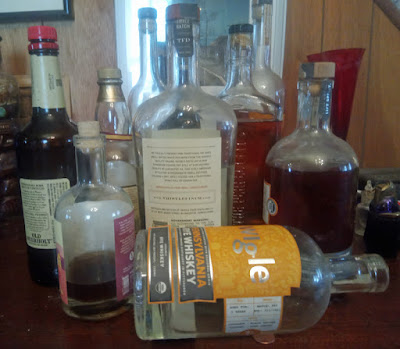.
Chapter 8: The Disaster of Prohibition
If Libertarianism has an Exhibit A, it has to be Prohibition. Prohibitionists had the very best of intentions. There is no denying that alcohol is responsible for a great deal of violence, crime, domestic abuse, fatal accidents and other ills. But rather than creating a kinder, gentler, and (given the motivations of most “drys” it has to be acknowledged) more Christian nation, Prohibition supercharged the growth of organized crime, corrupted police departments from coast to coast, and promoted a widespread cynicism about the American political system that has yet to subside. Also, ironically enough, drunkenness, both public and private, soared.
It is collective wisdom that during Prohibition, Americans made do with moonshine and bathtub gin, and so they did—if they were poor. A handful of distilleries were given special dispensation to produce alcohol for non-recreational purposes. The middle-class could drop by the pharmacy on the way home to buy a bottle of whiskey clearly marked FOR MEDICINAL PURPOSES ONLY. Those with money and connections bought cases of smuggled rum or tequila if they were near the southern border or Canadian whisky if they were near the northern border.
For fourteen years, Canadian whisky, silky-smooth and not at all spicy, was the best you could buy. American palates adjusted themselves accordingly.
Then prohibition ended and the distilleries reopened—those that could afford to wait several years for their product to age sufficiently to compete with businesses in Montreal and Kilmarnock.
The long-term effect of the Great Experiment on rye whiskey can be shown in parvu in the history of Old Overholt, the oldest continually-made American whiskey. The business was begun by Abraham Overholt who in 1810 began distilling rye on his family farm. Over the next century, it became the nation’s leading name in whiskey. When other distilleries were closing, it had the good fortune to receive a license to produce “medicinal whiskey” from the Secretary of State—none other than Andrew Mellon, a part-owner of the company. Things were looking good.
Repeal, however, was not kind to Old Overholt. Sales dwindled. The company was sold to Jim Beam in the 1950s and production moved from place to place before finally settling in Kentucky. The original mash bill did not go with it. The bottled in bond 100 proof manly bottle of rye became a low octane, high corn Kentucky style rye that was produced only a couple of days a year and routinely sold from the bottom shelf. By 1970, it was the only nationally-distributed rye in existence.
This does not necessarily mean you should rush out and become a libertarian. But those who already are have every right to say “I told you so.” Because they absolutely would have if they’d been around a hundred years ago.
To mourn the near-demise of rye whiskey and the part that politics played in it requires a pre-Prohibition cocktail like the Ward 8:
Ward 8
2 ounces rye whiskey
½ ounce lemon juice
½ ounce orange juice
3 teaspoons grenadine
2 or 3 speared cherries or a slice of orange
directions: mix, chill, and garnish with cherries, orange slice, or both
The Ward 8 was created in honor of a political boss in a Gilded Age bar in Boston’s Eighth Ward, and is basically a variant of the whiskey sour. Originally the cherries were speared by a small paper Massachusetts flag, but that’s obviously not required.
This is a solid drink, fruity without being sweet, whose flavor is sufficiently emphatic to cut through the miasma of cigar smoke and corruption in which it was born. An excellent way to celebrate the victories of your favorite if flawed politico.
So Prohibition was over and King Rye was all but dead. It was time for another whiskey to take up the crown.
*




1 comment:
Is that a Susan B. Anthony dollar coin used to stop the bottle from rolling? At least it's an empty bottle so it might not offend her temperance posture too much. While she missed it prohibition would have been right in her bailiwick!
Really enjoying these articles.
Post a Comment